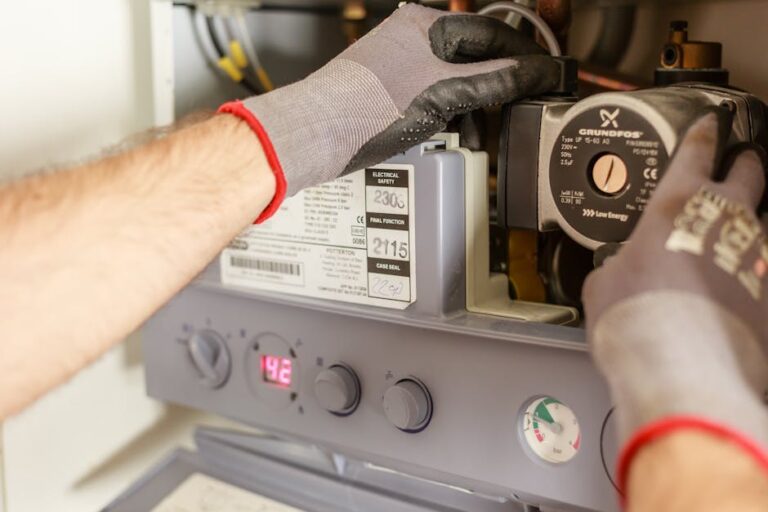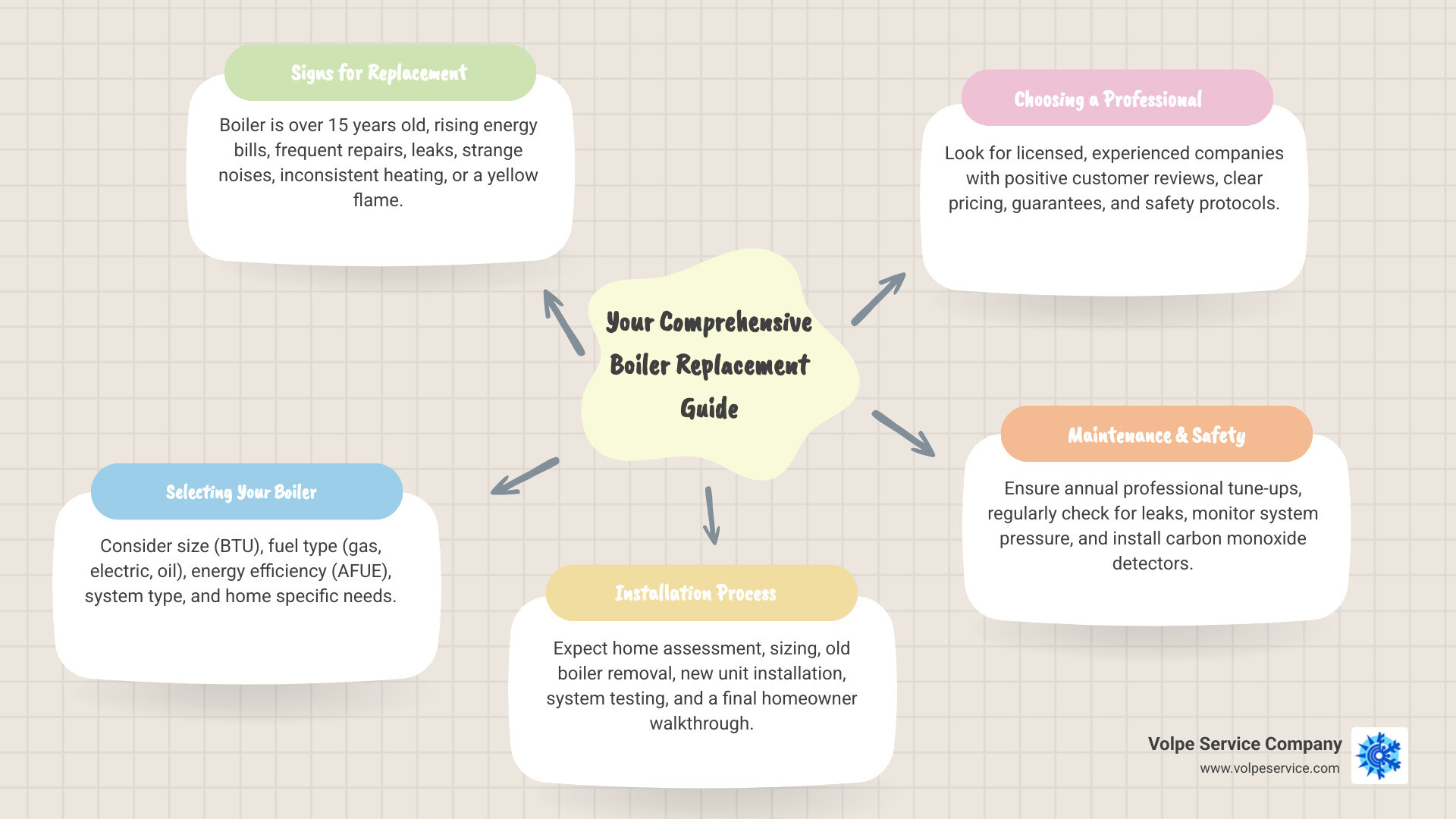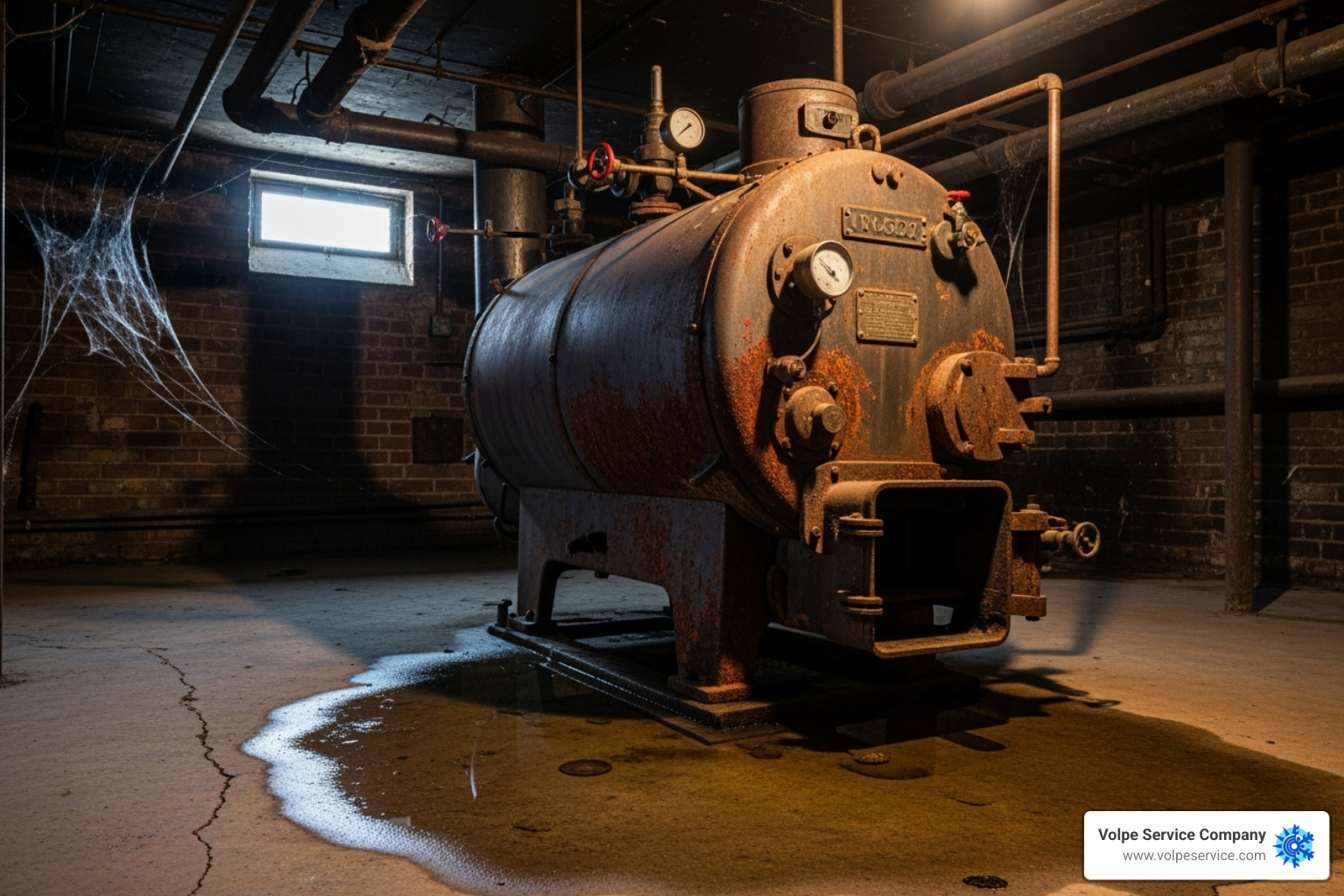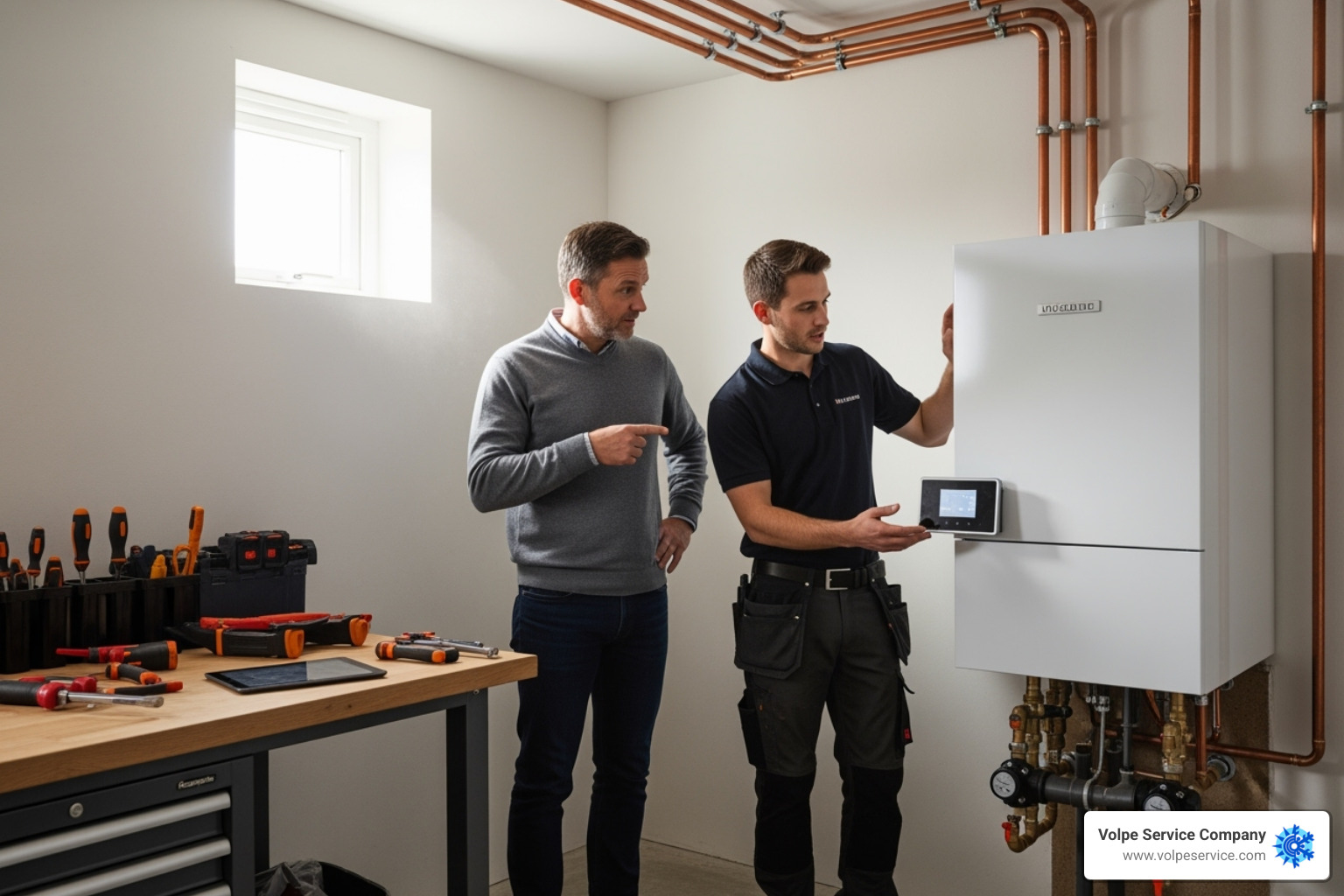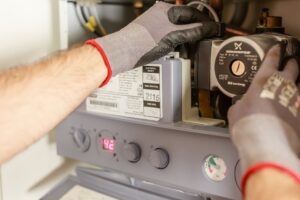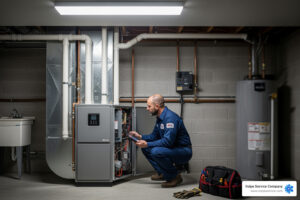Why Boiler Replacement Service Matters for Your Home
A boiler replacement service is essential when your heating system shows signs of age, inefficiency, or frequent breakdowns. Most boilers last 15-20 years, and knowing when to replace yours can prevent emergency situations and costly repairs.
Key signs you need boiler replacement service:
- Your boiler is over 15 years old
- Energy bills have suddenly increased
- Frequent repairs (more than twice per year)
- Water leaks or visible corrosion
- Strange noises (banging, gurgling, whistling)
- Yellow or orange flame instead of blue
- Uneven heating throughout your home
A sudden boiler failure on a cold day is a homeowner’s nightmare. The good news is that modern, high-efficiency boilers can save you significantly on energy bills while providing reliable, consistent heat.
When choosing a boiler replacement service, look for licensed professionals who will assess your home’s needs, recommend the right boiler, and handle the installation safely.
Is It Time for an Upgrade? Key Signs Your Boiler Needs Replacing
Boilers don’t last forever, and knowing when to replace yours can save you from emergency situations and ongoing repair headaches. While most modern boilers have a lifespan of 15-20 years, certain warning signs indicate it’s time for an upgrade, even if your unit hasn’t quite reached that milestone age.
When to Repair vs. Replace
The age-old question every homeowner faces is whether to fix or replace their boiler. The good news is that there are some clear guidelines to help you make this choice.
Consider replacement if your boiler is over 15 years old, as recommended by the U.S. Department of Energy. At this age, even a well-maintained boiler is at a higher risk of breaking down when you need it most.
Frequent repairs are another major red flag. If you’re calling for service more than once or twice a year, those repair bills add up. When a major component like the heat exchanger fails, investing in a new, more efficient system often makes more financial sense.
On the other hand, minor, infrequent repairs on a younger unit may be the more practical choice, potentially giving you several more years of reliable service.
Telltale Signs of a Failing Boiler
Your boiler will often signal when something is wrong. Here are the key warning signs that you might need a boiler replacement service:
- Age: Once a boiler passes the 15-year mark, its efficiency naturally declines, making replacement a smart consideration.
- Rising energy bills: A sudden spike in heating costs without a change in usage indicates your boiler is losing efficiency and burning more fuel.
- Frequent repairs: If you’re calling for service more than once or twice a year, the repair costs can quickly add up, making a new system more economical.
- Leaks or corrosion: Water pooling around the unit or visible rust often points to serious internal damage that a simple repair can’t fix.
- Strange noises: Banging, gurgling, or whistling can signal internal issues like mineral buildup or failing components that require attention.
- Inconsistent heating: If some rooms are too hot while others are cold, or your home takes longer to warm up, your boiler is likely struggling to distribute heat effectively.
- Yellow flame: For gas boilers, the flame should be blue. A yellow or orange flame indicates incomplete combustion, a sign of inefficiency and a potential carbon monoxide risk. Contact a professional immediately if you see this.
Recognizing these signs early allows you to plan your boiler replacement service on your own schedule, rather than during an emergency.
Choosing Your New Boiler: A Homeowner’s Guide
Selecting a new boiler is a significant investment in your home’s comfort and efficiency. The right choice depends on your home’s size, your family’s hot water demands, and your available fuel source. Understanding the different types and their features will help you make an informed decision you’ll be happy with for years to come.
Factors to Consider When Choosing a Boiler
When planning your boiler replacement service, several factors are key:
- Boiler Size (BTU Output): This is crucial. An undersized boiler will struggle to heat your home, while an oversized one will cycle on and off frequently (short-cycling), wasting energy and causing premature wear. We perform detailed heat loss calculations to determine the precise BTU output you need.
- Fuel Type: This often depends on what’s available and cost-effective in your area. Natural gas is popular for its efficiency and affordability, but electric and oil boilers are excellent alternatives.
- Energy Efficiency (AFUE): The Annual Fuel Utilization Efficiency (AFUE) rating tells you how much fuel is converted to heat. Modern condensing boilers can achieve 95% AFUE or higher, a dramatic improvement over older units (60-80%).
- System Type: Your hot water needs are a major factor. Combi boilers provide heat and hot water on demand, ideal for smaller homes. System boilers use a storage cylinder, great for families with higher hot water usage. Conventional boilers use separate tanks and are common in older, larger homes.
- Venting Requirements: Modern high-efficiency boilers often have different venting needs than older models, which a professional will assess.
Comparing Common Boiler Types
Here’s a breakdown of the main boiler types you’ll encounter:
| Fuel Type | Average Efficiency (AFUE) | Maintenance Needs | Key Benefits |
|---|---|---|---|
| Natural Gas Boiler | 80-98% | Annual professional servicing | High efficiency, readily available in many areas, cost-effective fuel, consistent heat, lower carbon footprint than oil |
| Electric Boiler | 99-100% | Very low; annual checks generally sufficient | No emissions, quiet operation, compact size, no flue or chimney needed, ideal for small homes or where gas isn’t available |
| Oil Boiler | 80-90% | Annual professional servicing, fuel delivery/storage | Good for areas without natural gas access, powerful heating capability, reliable performance |
Natural gas boilers are a popular choice for their high efficiency and low operating costs. Electric boilers are nearly 100% efficient and very quiet, but electricity costs can be higher than gas. Oil boilers are powerful and reliable, making them a great option in areas without natural gas access, though they require a storage tank.
A professional boiler replacement service can help you steer these options to find the perfect match for your home.
The Boiler Replacement Process: What to Expect
A professional boiler replacement service ensures your new system operates safely and efficiently. While steps may vary, a standard replacement follows a clear roadmap designed to minimize disruption to your home.
Key Factors in Your Boiler Replacement Service Decision
Our comprehensive process is built on decades of expertise:
- Initial Home Assessment: We thoroughly evaluate your current heating setup, home layout, and insulation to recommend the best solution.
- System Sizing Calculation: Using precise load calculations, we determine the exact boiler size (BTU output) your home needs to run efficiently for years.
- Removal of the Old Boiler: Our team safely disconnects and removes your old unit, handling disposal responsibly and in accordance with environmental regulations.
- Preparation of the Installation Area: We clean the space and make any necessary adjustments to piping or venting to accommodate the new system.
- New Boiler Installation and Connection: Our technicians connect your new boiler with precision, meeting all industry standards and local codes to ensure safety and protect your warranty.
- System Testing and Commissioning: We run the system through its paces, testing pressure levels, temperature settings, and safety controls to verify optimal performance.
- Homeowner Walkthrough: We show you how to operate your new system, explain the controls, and answer all your questions.
What to Expect from a Professional Boiler Replacement Service
When you work with a professional boiler replacement service, you should expect high standards:
- Punctual Arrival: Our technicians respect your time and arrive as scheduled, ready to work.
- Respect for Your Property: We use drop cloths and shoe covers and clean up thoroughly to treat your home as if it were our own.
- Licensed and Insured Technicians: Our team is fully trained, certified, and insured, giving you peace of mind.
- Clear Communication: We keep you informed throughout the process, explaining what we’re doing in straightforward terms.
- Thorough Cleanup: We leave your home cleaner than we found it, removing all old equipment and debris.
- Explanation of New System Controls: We ensure you understand how to operate your new boiler and thermostat for maximum efficiency and comfort.
Finding a Reputable Boiler Replacement Service
Choosing the right HVAC company is just as important as choosing the right boiler. A qualified and trustworthy team ensures your installation is done correctly, safely, and in compliance with all local codes, giving you peace of mind and a reliable heating system for years to come.
Qualities of a Top-Tier HVAC Provider
When searching for a boiler replacement service, here’s what separates the professionals from the rest:
- Experience and Licensing: Look for a company with decades of community service. Long-term experience means they can handle any challenge. Verify they hold all proper state and local licenses and are fully insured for your protection.
- Customer Reviews and Testimonials: Check online for consistent positive feedback regarding punctuality, professionalism, and quality of work. How a company responds to any negative feedback also reveals its commitment to customer satisfaction.
- Guarantees and Warranties: A top-tier provider will stand behind their installation with satisfaction guarantees and provide clear information about manufacturer warranties on your new boiler.
- Transparency: A reputable service provides clear explanations, detailed written estimates, and is happy to answer all your questions without pressure.
- Safety-Focused Approach: The right company will emphasize safety protocols and ensure all work meets local codes, never cutting corners when it comes to your family’s wellbeing.
At Volpe Service Company, we’ve been serving New Jersey families since 1963, building our reputation on honest, professional service and data-driven solutions. We believe every homeowner deserves the peace of mind that comes with knowing the job was done right the first time.
After the Install: Boiler Maintenance and Safety
Once your new boiler is installed, regular maintenance is key to maximizing its lifespan and efficiency. Proper care also helps prevent potential hazards, ensuring your home stays both warm and safe.
Boiler Maintenance Best Practices
Your new boiler is designed for reliability, but it needs some care to perform at its best.
- Annual Professional Tune-Ups: An annual service visit before the heating season is essential. A technician will inspect, clean, and tune your system for optimal performance. This prevents breakdowns, maintains your warranty, and ensures peak efficiency.
- Checking for Leaks: Periodically check around your boiler and its pipes for any drips or puddles. Catching small leaks early can prevent larger, more expensive problems.
- Monitoring System Pressure: Your boiler’s pressure gauge should typically read between 12-15 psi when cold. If it’s consistently too high or low, call a professional.
- Keeping the Area Clear: Your boiler needs adequate space for ventilation. Avoid storing items near the unit to ensure safe operation.
- Understanding Your Thermostat: Learn your thermostat’s programming features to save energy while maintaining comfort.
Critical Safety Considerations
Modern boilers are very safe when properly maintained, but awareness is key.
- Carbon Monoxide Detectors: These are non-negotiable. Install CO detectors on every level of your home, especially near sleeping areas. If the alarm sounds, evacuate immediately and call for emergency services from outside.
- Recognizing Gas Smells: Natural gas has a distinct “rotten egg” odor. If you smell it, do not use any electronics or switches. Evacuate your home, then call your gas company and emergency services from a safe distance.
- Emergency Shut-Off Procedures: During your boiler replacement service walkthrough, we’ll show you the emergency shut-off switch and fuel valve. Knowing how to quickly shut down the system in an emergency can prevent further damage.
- What to Do in an Emergency: If your boiler breaks down, especially in freezing weather, contact us immediately. Do not attempt to fix complex issues yourself. Your safety is our top priority.
Frequently Asked Questions about Boiler Replacement
Replacing your boiler is a big decision, and it’s natural to have questions. Here are the most common ones we hear, with our straightforward answers.
How long does a new boiler last?
With proper annual maintenance, a new, high-efficiency boiler can last between 15 and 20 years. Its lifespan is also affected by usage, water quality, and the quality of the initial installation. A professionally installed and correctly sized boiler from an expert boiler replacement service will last longer and run more efficiently.
What are the benefits of upgrading to an energy-efficient boiler?
The primary benefits are lower monthly energy bills due to higher efficiency (90-95% or more). You’ll also enjoy more consistent and reliable heating, quieter operation, and a smaller environmental footprint due to fewer greenhouse gas emissions.
How often should a new boiler be serviced?
Your boiler should be serviced once a year. Annual maintenance ensures peak efficiency, helps prevent unexpected breakdowns, is often required to maintain the manufacturer’s warranty, and verifies the safe operation of your system. At Volpe Service Company, we’ve been helping New Jersey families keep their boilers running safely and efficiently since 1963.
Your Partner for a Warm and Comfortable Home
Replacing your boiler isn’t just about fixing a heating problem – it’s about investing in your home’s long-term comfort, safety, and efficiency. When you recognize those telltale signs of a failing unit early, understand your options thoroughly, and choose the right qualified professional, you’re making a smart decision that will keep your family warm for decades to come.
We know how overwhelming it can feel when your boiler starts acting up. Nobody wants to deal with cold mornings, rising energy bills, or the stress of an unexpected breakdown in the middle of winter. That’s exactly why having a trusted partner makes all the difference.
For homeowners throughout New Jersey, the experienced and dedicated team at Volpe Service Company has been providing guaranteed, data-driven HVAC solutions since 1963. That’s over 60 years of keeping families comfortable through every season! We’re not just another boiler replacement service – we’re your neighbors who understand exactly what New Jersey winters can throw at your heating system.
Our family-owned approach means we treat every home like it’s our own. We believe in honest, professional service backed by real data and proven results. When we say guaranteed, we mean it. Your comfort and safety aren’t just our job; they’re our commitment to this community.
Ready to ensure your home is prepared for any season ahead? Explore our professional heating replacement services and find why so many New Jersey families have trusted us to keep them warm since the Kennedy administration. Because when it comes to your family’s comfort, you deserve a partner who’s been getting it right for generations.


